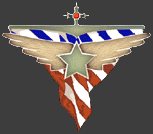Allied Units
Buildings
The Allied Nations are defensivly minded first through choice and then through necessity. The defensive mindset of the old guard leaders is embodied by the Maginot Line turrets and in the thick reinforced concrete bunkers that make up the command centre and forward barracks of the Allied Nations. After their early defeats the Allies are forced to be defensive through the necessity of their slow tanks and impoverished economy. Once the US joins the battle, their bastion can then be used to resist the enemy while they build up their forces in preparation for their late game offensives.
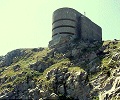 Command
Command Centre
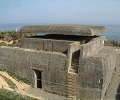 Allied
Allied Barracks
 Air
Air Tower
 Radar
Radar Tower
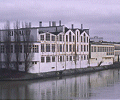 French
French Factory
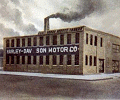 Light
Light Factory
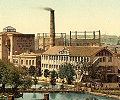 Heavy
Heavy Factory
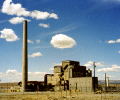 Manhatten
Manhatten Centre
 Mine
Mine Field
 Tank
Tank Traps
 Guard
Guard Towers
 Concealed
Concealed Pillboxes
 Maginot
Maginot Turret
 Back
Back
Command Centre
Tech:
StartCost:
2500Build Time:
45 secsBuilt By:
DozerHealth:
10000Armour:
ConcreteMaximum:
1The command center is the core of your war effort. If is the command and control center that directs the whole battlefield. From here you can construct dozers, build motorised infantry and build supply trucks to send cash to your allies. There can only be one command centre at a time and it cannot be sold, and so it is essential to have spare dozers in case it is lost. The command center coordinates the battle and as such enables the minimap. It also coordinates the diplomatic drive to persuade the US to enter the war. Once this is achived the command centre then organises the delivery of US lend-lease shipments.
 Back
Back
Allied Barracks
Tech:
StartCost:
4000Build Time:
20 secsBuilt By:
DozerHealth:
1200Armour:
ConcreteIndustrial Power:
-2Barracks train all infantry. They are rallying points and allow for the distribution of supplies, including spare parts and medical supplies. Infantry can enter the barracks to be healed from their wounds while tanks can also return to them for repairs. Since they drain supplies they have a cost to the overall economy. The Allied barracks are solid redoubts, able to serve as a defensive bunker as well as a barracks. They have are a solid fortification which costs a lot to build, but they can help to anchor a newly siezed position.
 Back
Back
Air Tower
Tech:
StartCost:
7500Build Time:
30 secsBuilt By:
DozerHealth:
7500Armour:
ConcreteIndustrial Power:
-5The air tower co-ordinates all Allied planes in the region. They can requision fighter patrols, recon sweeps, bombing strikes and interdiction by close air support. Although they do not build any aircraft directly they have a constant drain on the economy, assigning supplies and replacements to the squadrons assisting the forces in their theatre.
 Back
Back
Radar Tower
Tech:
Level 2Cost:
5000Build Time:
15 secsBuilt By:
DozerHealth:
2000Armour:
[ none ]Radar must be activated to begin searching for enemy planes. Once activated it will periodically reveal any enemy aircraft allowing for a much more coherent response to enemy air threats. The radar is a vital tool for waging air war and so should be kept well protected. It is vulnerable to enemy attack aircraft and given its pivotal role in air defence will probably be a primary target.
 Back
Back
French Factory
Tech:
Only at the Start (disabled once a British factory is built)Cost:
15000Build Time:
15 secsBuilt By:
DozerHealth:
7500Armour:
ConcreteIndustrial Power:
+8Maximum:
2The French industry is crippled by strikes and the anti-war sentiment of many left-wingers. Unscrupulous trade unions consider the war a good time to pressure the authourities into giving them better working conditions. Thus one of the most modern arms industries is operating far below capcity. However the tanks that are being built are a match for any contemporary war machines, if not in mobility then at least in terms of firepower and armour. The most worrying part of the French war economy is the precarious situation of the French nation. Hubris and a false belief in their superiour equipment has left flaws in their defences and it is only a matter of time before the French mainland is taken out of the war. When the central command deems the situation is unsustainable the armed forces will be evacuated to the British Isles, signified by the construction of British factories. The French factories will be shut down and left unable to build any new units.
 Back
Back
British Light Factory
Tech:
Level 1 (limit 1) / Level 3 (limit 2)Cost:
15000Build Time:
15 secsBuilt By:
DozerHealth:
7500Armour:
ConcreteIndustrial Power:
+8Maximum:
1 / 2British light factories build light vehicles such as the ubiquitous Bren Carrier and artillery like the 17 pounder and lighter tanks such as the Valentine. They also recieve and refit US vehicles recieved under the Lend Lease Agreement such as Studebaker trucks and Sherman tanks. They build the fearsome Fireflys by combining the Shermans and the 17pdr AT guns. As the British economy gears up for war the number of factories can be doubled, going from one light and one heavy to two lights and two heavies.
 Back
Back
British Heavy Factory
Tech:
Level 1 (limit 1) / Level 3 (limit 2)Cost:
15000Build Time:
30 secsBuilt By:
DozerHealth:
7500Armour:
ConcreteIndustrial Power:
+12Maximum:
1 / 2British Heavy factories build heavy vehicles which includes most British tanks. They can also be used to build the fearsome Tortoise SPG. As the British economy gears up for war the number of factories can be doubled, going from one light and one heavy to two lights and two heavies.
 Back
Back
Manhatten Project Research Centre
Tech:
US Intervention, Level 3Cost:
65000Nuclear Technologies:
1 - 6 (25000 per technology - 150000 total)Cost Per Bomb:
50000Build Time:
60 secsBuilt By:
DozerHealth:
20000Armour:
ConcreteIndustrial Power:
-10Maximum:
1The Manhatten project is one of the most expensive weapons programmes ever undertaken, but its impact on world events has been absolute. Building the Manhatten research centre is only the first step towards aquiring the bomb. Once it is built a series of technological advances must be funded, each one cripplingly expensive. Finally the player will be able to start building the bombs themselves. These are hugely expensive weapons in their own right. For all this expense, the pure destructive power of the atomic bomb is unparalleled and causes total destruction within the enormous blast zone. A couple of bombs is a war ending asset, wiping out enemy bases and whole armies in a single strike. While the morality of using such weapons is dubious, the end result is the saving of the lives of many soldiers. The US is still using the purple hearts produced in anticipation of the casualties from an invasion of Japan - each one a casualty avoided thanks to the use of these terrifying bombs.
 Back
Back
Mine Field
Tech:
StartCost:
5000Build Time:
45 secsBuilt By:
EngineerA mine field is a delaying weapon. It is invisible to most units and can be used to create a deadly trap for uncautious enemy armour. While it does no real damage to enemy tanks, the mines will disable any armoured vehicle that rolls over them, blasting off tracks, stunning the crew and generally causing mayhem and confusion. When combined with concealed anti-tank guns they can create deadly kill-zones where disabled enemy tanks are then counter-attacked and destroyed without being able to fire a single shot.
 Back
Back
Tank Traps
Tech:
StartCost:
1600Build Time:
30 secsBuilt By:
EngineerTank traps are peices of metal welded into self-righting obstacles. They are hard to destroy quickly and are impossible to drive over with a tank. Thus they are a cheap and effective means to block enemy movements. While creating a complete barrier across a large area is too costly to be practical, they are great for blocking off streets or funneling enemy troops into mine fields or concealed defences as they try to bypass them.
 Back
Back
Guard Towers
Tech:
StartCost:
1100Build Time:
7 secsBuilt By:
EngineerHealth:
500Armour:
WoodThese Guard Towers are designed to give an observer good views over the surrounding terrain. They are also equipped with a machinegun and so can give good protection against infantry, especially infiltrators such as partisans who operate without heavy support.
 Back
Back
Concealed Pillboxes
Tech:
StartCost:
1200Build Time:
8 secsBuilt By:
EngineerHealth:
2000Armour:
LightPillboxes are light concrete bunkers for infantry to hide in. They use camouflage netting to conceal themselves allowing the infantry inside to launch supprise attacks on passing enemy troops from relative safety. While they are concealed to some extent, they will become obvious to anyone who gets close enough, even units who cannot normally detect stealth. Likewise, the concrete will give limited cover to the infantry inside, but they cannot be expected to withstand a sustained assault.
 Back
Back
Maginot Turrets
Tech:
Only at the Start (disabled once a British factory is built)Cost:
100Build Time:
30 secsBuilt By:
EngineerHealth:
1500Armour:
ConcreteFirepower:
250 (high explosive - double shot)Rate of Fire:
2 secsRange:
444Maximum:
3The Maginot line is a huge series of very modern defences, built to repel an assault by conventional
forces into France across the German border. They already exist at the start of the war and so the player
is able to place his turrets in a strategically suitable place at practially no cost. However once the
fighting relocates to Britian the ability to build new turrets will obviously no longer be availible.
The turrets themselves are the centerpiece of the Maginot line, which really incorporates everything
from mines to concealed guns, pillboxes and tank-traps. The turrets are serviced by massive underground bunkers and
are very strong, able to withstand a frontal assault by almost limitless numbers of enemy tanks. The
turrets contain a pair of 75mm HE cannons which can out-range most tank guns of the period. Essentailly,
they are able to block enemy progress through strategically important areas. They can cover a flank and
reduce the number of places that the land forces must defend. However they are not a complete defensive
line. As with any static defense they can be out-flanked or suppressed with smoke and so the Allied player
must remain vigilant and be sure to cover his other vulnerable areas.
